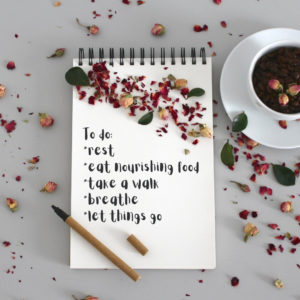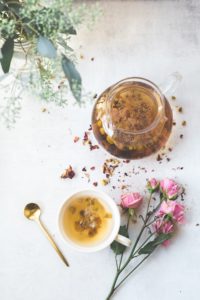Stressed out
The term “self-care” gets bandied about a lot these days and while long hot baths or some eco-friendly retail therapy certainly have their benefits, true self-care is acknowledging that sometimes it’s ok to not feel ok. Naturopath, Sonya Byron, shares some effective herbal remedies to help boost your wellbeing in times of stress.

It’s been a stressful year for many of us in the mountains, between the bushfires, the floods and now COVID-19. And whether your stress is temporary (such as the butterflies we all experience before a big event) or ongoing for weeks, months or even years on end, it’s clear that too many stressors can take a major toll on our health. This can manifest in a range of physical and mental symptoms, such as digestive disturbance, headaches and backaches, fatigue and insomnia, and anxiety and emotional overwhelm. Thankfully, we can learn to manage our stress so that it has less of an impact on our health and wellbeing, and a little natural self-care with the help of our herbal allies is one way we can do this.
A few of my favourite plant medicines for stressful times include:
Chamomile (Matricaria recutita)
Peter Rabbit’s mother knew what she was doing when she gave him a calming cup of chamomile tea after he ventured onto Farmer MacGregor’s land and almost became rabbit stew! Chamomile has been used for centuries to alleviate stress, and in recent times, this traditional use has been substantiated by clinical trials proving the herb to be an effective and safe remedy for the symptoms of Generalised Anxiety Disorder. In clinic, I like to prescribe chamomile for stress that manifests as digestive symptoms, such as appetite loss, cramping pain and nausea. A mild and pleasant tasting herb, chamomile is also good for restless kids who don’t want to go to bed.
Lavender (Lavandula officinalis)
Most of us love the smell of lavender, and this scent can exert a powerful, soothing and relaxing effect on stressed nervous systems! The herb makes a lovely calming and comforting tea, or you can add a few drops of lavender essential oil to a diffuser, to a spray bottle to mist your pillows before bed, to the bath with some epsom salts, or to a carrier oil for massage (never take essential oils internally without expert advice). With its strong, anti-spasmodic action, I have found lavender to be particularly effective for clients with stress that manifests in muscle spasms and tension headaches.
Lemon balm (Melissa officinalis)
When my to-do list is too long and I’m feeling anxious and overwhelmed, I always opt first for lemon balm to help me relax. The herb’s beautiful aroma and delicious, lemony taste are very soothing, without being too soporific to take during the day. I have found lemon balm to be especially effective for clients with stress that manifests as insomnia, and in digestive symptoms such as “butterflies in the stomach”. Traditionally known as the “gladdening herb,” lemon balm has been used for centuries to uplift the heart and the spirit, and is loved by both children and adults alike.
Passionflower (Passiflora incarnata)
A very helpful herbal ally for those of us with busy brains, Passionflower exerts a powerful, calming effect on anxious, overthinking, ruminating minds, and can also assist in alleviating pain. In clinic, I have found passionflower to be especially effective for clients who experience both difficulty falling asleep and difficulty staying asleep.
Skullcap (Scutellaria lateriflora)
If you’re experiencing anticipatory anxiety before a big event, and especially if this is keeping you awake at night, then skullcap may be the herb for you. A powerful sedative herb, I prescribe skullcap whenever my clients report “racing” minds or “frayed” nerves. The herb can be especially beneficial if you’re prone to waking in the middle of the night and have trouble falling asleep again.

All of the above herbs are available (organically grown, dried, and in bulk) at Blue Mountains Food Co-op, so experiment with them alone and in combination and see what’s effective for you. I like to combine a teaspoon each of chamomile, lavender, and lemon balm in a mug of freshly boiled water during the day (steep, covered, for a minimum of five minutes before consuming). In the evening, I might enjoy the same blend again, or add a teaspoon each of passionflower and skullcap to the mix to help me wind down and relax my mind after a busy day, and to support getting a good night’s sleep.
Enjoy!
(This information is intended for general educational purposes and is not a substitute for professional advice from a health care practitioner. Consult with your friendly local herbalist or
naturopath for individualised prescribing).
Sonya Byron is a naturopath and Yoga teacher in practice at Lower Mountains Health & Healing in Blaxland (and online). She offers herbal, naturopathic and nutritional medicine consultations, customised meal planning and therapeutic Yoga sessions. For further information, please see sonyabyron.com.au.


